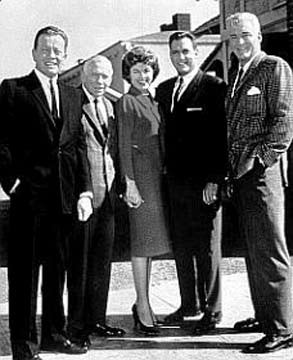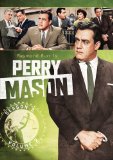| Reviews & Columns |
|
Reviews DVD TV on DVD Blu-ray 4K UHD International DVDs In Theaters Reviews by Studio Video Games Features Collector Series DVDs Easter Egg Database Interviews DVD Talk Radio Feature Articles Columns Anime Talk DVD Savant Horror DVDs The M.O.D. Squad Art House HD Talk Silent DVD
|
DVD Talk Forum |
|
|
| Resources |
|
DVD Price Search Customer Service #'s RCE Info Links |
|
Columns
|
|
|
Perry Mason - Season 3, Volume 2
This is not a complaint. In Perry Mason's case, that's part of the charm. Though it would have been nice to see attorney Perry Mason's (Raymond Burr) relationship with secretary Della Street (Barbara Hale) explored further, or to maybe have Perry lose a case occasionally, or to see it abandon the self-contained story structure in favor of season-long story arcs of the type standard in television drama today, the familiarity of Perry Mason is equally valuable in its own way.
For those wanting general impressions of the show, this review incorporates elements from the five previous Perry Mason reviews penned by this writer. Below that are some comments particular to this edition.
For the uninitiated, the show revolves around Los Angeles-based celebrity attorney Perry Mason (Raymond Burr), his loyal assistant Della Street (Barbara Hale), and their pal Paul Drake (William Hopper), a breezy private detective steadily in Mason's employ. Each week Perry comes to the rescue of a defendant (usually) accused of murder. In most of these cases, Perry is up against wily police Lt. Tragg (Ray Collins) and District Attorney Hamilton Burger (William Talman).
Though the show's format would seem pretty restrictive - Perry's clients are always innocent, hapless and exasperated Burger always loses the case (though he's not a sore loser; he and Perry remain quite friendly), and Perry always exposes the real murderer - the writers manage to come up with a wide and engaging variety of storylines. Despite these restrictions the show so far never feels likes it's slipping into a tired routine.
Essentially a mystery show with a courtroom setting for its climax, Perry Mason's single flaw is that as a mystery it doesn't really play fair with its audience, though the same could be said for B-movie mysteries of the 1930s and '40s, radio mystery shows, and virtually all other TV whodunits. Sherlock Holmes and Hercule Poirot (to name two examples) faced seemingly irresolvable cases with bizarre, inexplicable clues - yet the solutions were always quite simple and logical. The great literary detectives simply had powers of observation lost on us mere mortals, even though we're armed with the same information as those protagonists. .
On the other hand, Perry Mason, the Charlie Chan movies, Murder, She Wrote, etc. operate under a different set of rules. The resolutions to the mysteries don't always make sense and audiences often don't have access to the same clues the protagonists do, and they often leap to conclusions and solve crimes in ways that don't hold up to scrutiny. Instead, these kinds of movies, TV and radio shows rely heavily on atmosphere, characterization and star power to entertain their audiences. One might guess who the real murderer is, but in most cases you won't be able to solve the mystery on your own.
Fortunately Burr, Hale, and Hopper and just wonderful in their roles. Apparently they became close friends in real life, and this camaraderie very much extends to their scenes together on the show. About the middle of season two, Talman's Hamilton Burger started getting more shading, a welcome addition. Often regarded as television's most thankless role, Hamilton Burger this season still is Perry's weekly nemesis, but now he's more affable outside the courtroom and flexible in, especially when new evidence casts a shadow of a doubt over the guilt of Perry's client.
Notes on Season 3, Volume 2
The single noteworthy shake-up to the established Perry Mason formula is the sudden disappearance of actor William Talman, whose career was nearly destroyed in a notorious scandal. He was arrested on March 13, 1960 at a private party in a Beverly Hills home where police reportedly found Talman and other guests nude, and marijuana was found at the residence. (To say the least, Talman is not exactly the first actor you'd expect to find in this situation.) Though the Perry Mason unit, buttressed by strong fan support, eventually got Talman reinstated, CBS invoked the "morals clause" of Talman's contract and fired him for the rest of the third season and for roughly the first half of the fourth.
The first post-arrest episode to air, "The Case of the Bashful Burro" (airing March 26) didn't happen to feature Hamilton Burger - the show was set in a frontier town - meaning either CBS lucked out or shuffled its schedule to air this Talman-less episode when it did. New opening titles were shot and, beginning with the next episode, "The Case of the Crying Cherub" (which aired on April 9), Talman is not credited and starting here various "Deputy D.A.s" would take his place, played by actors such as Robert Gist, David Lewis, and Les Tremayne. Other shows late in the series, like "The Bashful Burro," found Perry working his magic out of town. (Talman does appear in the last episode of the season, "The Case of the Flighty Father," which aired in June but presumably was shot before Talman's arrest and withheld.)
One other note about this set: One episode, "The Case of the Wary Wildcatter," included in the Perry Mason - 50th Anniversary Edition set is included here as well, but that's the only repeated episode.
Guest-starring in this batch of episodes: I. Stanford Jolley, Kenneth MacDonald, Frank Maxwell, Madlyn Rhue, Marshall Thompson, Frank Albertson, Michael Fox, Barbra Fuller, Dabbs Greer, Ruta Lee, J. Pat O'Malley, Charles Aidman, Joan Staley, Barbara Bain, Douglas Kennedy, Beverly Garland, Lawrence Dobkin, Louise Fletcher, Norman Fell, Bill Erwin, Allison Hayes, Stafford Repp, Fredd Wayne, H.M. Wynant, Richard Gaines, Elisabeth Fraser, Ben Wright, Tom Drake, Joe Maross, Mala Powers, Abraham Sofaer, Bert Convy, Morris Ankrum, Leslie Parris, Marie Windsor, Stephen Chase, Hugh Marlowe, Edward Platt, Ann Robinson, Walter Burke, Marilyn Eastman, Robert Emhardt, Denver Pyle, Irene Tedrow, Ken Lynch, Francis X. Bushman, Berry Kroeger, and Hayden Rorke.
Video & Audio
CBS DVD's Perry Mason - Season 3, Volume 2 presents 14 terrific-looking episodes spread over four single-sided, dual-layered DVDs (four shows on the first two discs, three on the last two). The black and white full-frame image is very sharp and detailed with strong blacks. The Dolby Digital English mono is generally quite good, too, though a bit distorted on an episode or two. (One late-season episode has notably wobby sound during Fred Steiner's famous theme music, "Park Avenue Beat.") Episodes are not time-compressed, with some running close to 53 minutes. The music does not appear to have been altered. The discs are closed-captioned, though no other subtitle option is offered.
Extra Features
Nothing.
Parting Thoughts
Perry Mason is a terrific show, well-produced with a highly enjoyable regular cast and weekly guest stars familiar to those who watch a lot of '50s and '60s television. The fact that the show never really changed all that much during its nearly decade-long run matters not one bit to its fans, this writer included. Highly Recommended.
Film historian Stuart Galbraith IV's latest books, Japanese Cinema and The Toho Studios Story, are now available for pre-order.
|
| Popular Reviews |
| Sponsored Links |
|
|
| Sponsored Links |
|
|
| Release List | Reviews | Shop | Newsletter | Forum | DVD Giveaways | Blu-Ray | Advertise |
|
Copyright 2024 DVDTalk.com All Rights Reserved. Legal Info, Privacy Policy, Terms of Use,
Manage Preferences,
Your Privacy Choices | |||||||















